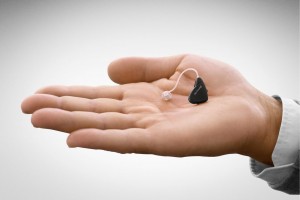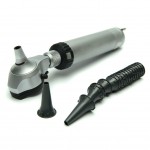
Buying a hearing aid can be an overwhelming and frustrating experience without some guidance along the way. This can be especially true if this is your first experience in correcting a hearing loss. First of all, take a deep breath and relax. We’ll guide you step by step through the process. We’ll cover the following:
- Get a medical check up.
- Have your hearing tested.
- Where to buy hearing aids.
- What questions to ask.
- Considerations on what type to buy.
- After buying – what’s next?
Get a Medical Check Up
 Before purchasing hearing aids to correct a hearing loss you need to first determine if there is a medical issue causing the problem. You can start with your family doctor or an ear, nose and throat specialist (otolaryngologist). They will complete a thorough examination and determine the next steps. After all medical issues are resolved or ruled out you may be referred to an audiologist for a hearing test.
Before purchasing hearing aids to correct a hearing loss you need to first determine if there is a medical issue causing the problem. You can start with your family doctor or an ear, nose and throat specialist (otolaryngologist). They will complete a thorough examination and determine the next steps. After all medical issues are resolved or ruled out you may be referred to an audiologist for a hearing test.
Have Your Hearing Tested
What is an audiologist? Audiologists hold a doctoral degree and are licensed by the state to practice audiology. They diagnose and treat patients’ hearing issues using techniques and procedures that are advancing with improved technology. An audiological examination, or hearing test, is conducted in a sound proof booth and the graphical results are plotted out on paper or electronically. This is called an audiogram. Make sure the test results are explained clearly to you. Based on the results a recommendation can be made on whether or not hearing aids are needed or whether some other non-medical treatment may be appropriate.
Where to Buy Hearing Aids
If aids are recommended then the next step is to determine where to purchase your aids. You can get a copy of your hearing test results and go elsewhere or you can likely purchase them direct;y from your audiologist. A lot, if not most audiologists are dispensing audiologists. This means along with conducting audiological examinations they also sell and fit hearing aids for their patients. If you like the service you have been provided then this is a great option. It’s all about good customer service! If you are interested in finding a different hearing healthcare professional you can take your audiogram results with you and start your search. To determine if a healthcare professional is licensed, check with your local Better Business Bureau, consumer protection agency, State Attorney General’s office, or the American Speech-Language-Hearing Association (ASHA). Whoever you select just make sure you are comfortable with their service and credentials. This will likely be a long term relationship, just like your family doctor.
What Questions to Ask
As you step into the buying process you may have a lot of questions on your mind. If you are not sure what questions to ask then use the list below to start from.
- How much do hearing aids cost?
- How long is the trial or adjustment period for me to try them out? (This option should be available. This is very typical.)
- What fees will not be refunded if I am not satisfied and return the aids after the trial and adjustment period?
- How long is the warranty and what is covered? Can it be extended?
- With my hearing loss is one or two aids recommended?
- Which type of hearing aid is best for my lifestyle, needs and budget? Also, what features and options are available.
- Are the extra features and options really worth the cost?
- Is repair and maintenance of the aids included in the warranty coverage?
- I am not comfortable going without my aids while mine are being repaired. Can you loan me aids temporarily?
- What are the proper care procedures?
There may be other questions in your mind that are not listed here. Don’t be afraid to print these out and add more if needed. You want to get as much detail and information as possible to help you make an informed decision. This is a big investment.
Considerations on What Type to Buy
There are several things to consider in your buying decision. Other than the issue of addressing your hearing loss, the next issue that may be on your mind is the cost. If you have insurance coverage this is obviously a big help. As you will find out there are several different types of hearing aids available. Each with different options, features and costs. Your audiologist will help you weigh your options and benefits for each. You may be limited on which type you can use based on the severity of your hearing loss. Ultimately, your service provider can make recommendations, but the decision will be yours. Take into consideration your lifestyle, personality and budget. Even though it may not feel like it at first because the whole process is a bit overwhelming, the hearing aids will improve your quality of life for you and your family.
After Buying – What’s Next?
 After you complete the purchase, follow-up care is recommended. Typically, you can drop in about once every six months for a quick cleaning and inspection. This will ensure your aids are properly maintained and any issues that may arise can be addressed right away. Also, ask your audiologist about periodic adjustments to the programming of the hearing aids. Your hearing can change over time and adjustments may be necessary.
After you complete the purchase, follow-up care is recommended. Typically, you can drop in about once every six months for a quick cleaning and inspection. This will ensure your aids are properly maintained and any issues that may arise can be addressed right away. Also, ask your audiologist about periodic adjustments to the programming of the hearing aids. Your hearing can change over time and adjustments may be necessary.
Image credit: Jim Dollar